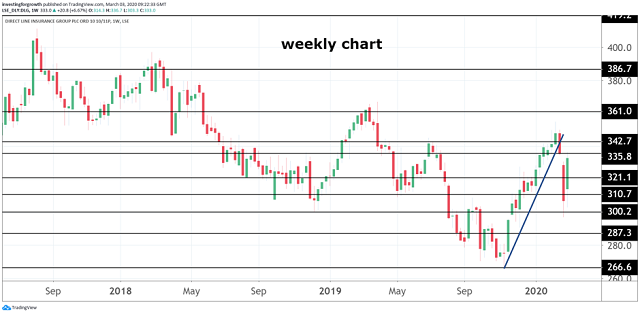Direct Line: Investors chase 7% dividend yield
After crashing with global stock markets, our head of markets explains why the shares are popular again.
3rd March 2020 09:34
by Richard Hunter from interactive investor
After crashing with global stock markets, our head of markets explains why the shares are popular again.

Direct Line Insurance (LSE:DLG) has had a difficult time of late, resulting in its relegation from the FTSE 100 index in September, but its determination to drag the business to the next level is showing some early signs of progress.
For the most part, the key metrics have declined from the previous year’s numbers, yet are fairly strongly ahead of expectations. Of particular relief is a creditable performance in the second half which, all things being equal, should set the group up for a pleasing performance this year.
The group’s previous suggestion that share buybacks would be preferred to special dividends has been confirmed, with a programme of £150 million announced. Not only should this be supportive to the share price, but in terms of shareholder returns it adds to the current dividend yield of around 7%, which is adequately covered and is enticing for income-seeking investors.

Source: TradingView Past performance is not a guide to future performance
Meanwhile, within the brands which give the business strength, such as the Direct Line brand itself and Churchill, there was also a strikingly improved performance from Green Flag. The new addition to the stable, Darwin, which is aimed at the price comparison website market, is also showing early signs of keeping the group in line with the ever-evolving competition.
At the same time, the strength of the group’s balance sheet leaves it well positioned to benefit from future opportunities as they arise. The solvency capital ratio stands at 165%, which is perfectly adequate even if the figure dipped slightly from a previous level of 170%. The return on tangible equity figure, also slightly down, nonetheless came in at 20.8%, well ahead of the group’s own 15% target.
- 10 stocks for the future?
- 10 value stocks with solid momentum
- Take control of your retirement planning with our award-winning, low-cost Self-Invested Personal Pension (SIPP)
Less positively, the operating and pre-tax profit figures showed declines of 9% and 12.2% respectively. The combined operating ratio also increased to 92.2% from 91.7%, although comfortably within the all-important 100% figure (combined operating ratio measures insurance underwriting profitability. A figure above 100% means the underwriting is unprofitable).
In terms of the day to day business, it has not yet been possible to estimate damage from storm Jorge, with the previous Ciara and Dennis likely to result in claims to the tune of around £35 million. In addition, restructuring and one-off cots have not helped the overall result, there was a lower level of releases to bolster profit and there were some previous property and investment gains which were not repeated this time round. The intensely competitive motor insurance market is also one where the group will need to consistently be on its game.
Even so, the fact that Direct Line has, to a large extent, trumped expectations has given the share price a welcome boost in early trade, helped along also by the broader market tailwind.
Indeed, the shares are beginning to knock on the door for a return to the premier index at these levels, which would be impressive given the previous share price decline of 13% over the last year, compared to a dip of just 0.6% for the wider FTSE 250 index.
The general direction of travel is positive though, particularly over the last few months, as indeed is the market consensus which has recently improved to a “buy”.
These articles are provided for information purposes only. Occasionally, an opinion about whether to buy or sell a specific investment may be provided by third parties. The content is not intended to be a personal recommendation to buy or sell any financial instrument or product, or to adopt any investment strategy as it is not provided based on an assessment of your investing knowledge and experience, your financial situation or your investment objectives. The value of your investments, and the income derived from them, may go down as well as up. You may not get back all the money that you invest. The investments referred to in this article may not be suitable for all investors, and if in doubt, an investor should seek advice from a qualified investment adviser.
Full performance can be found on the company or index summary page on the interactive investor website. Simply click on the company's or index name highlighted in the article.